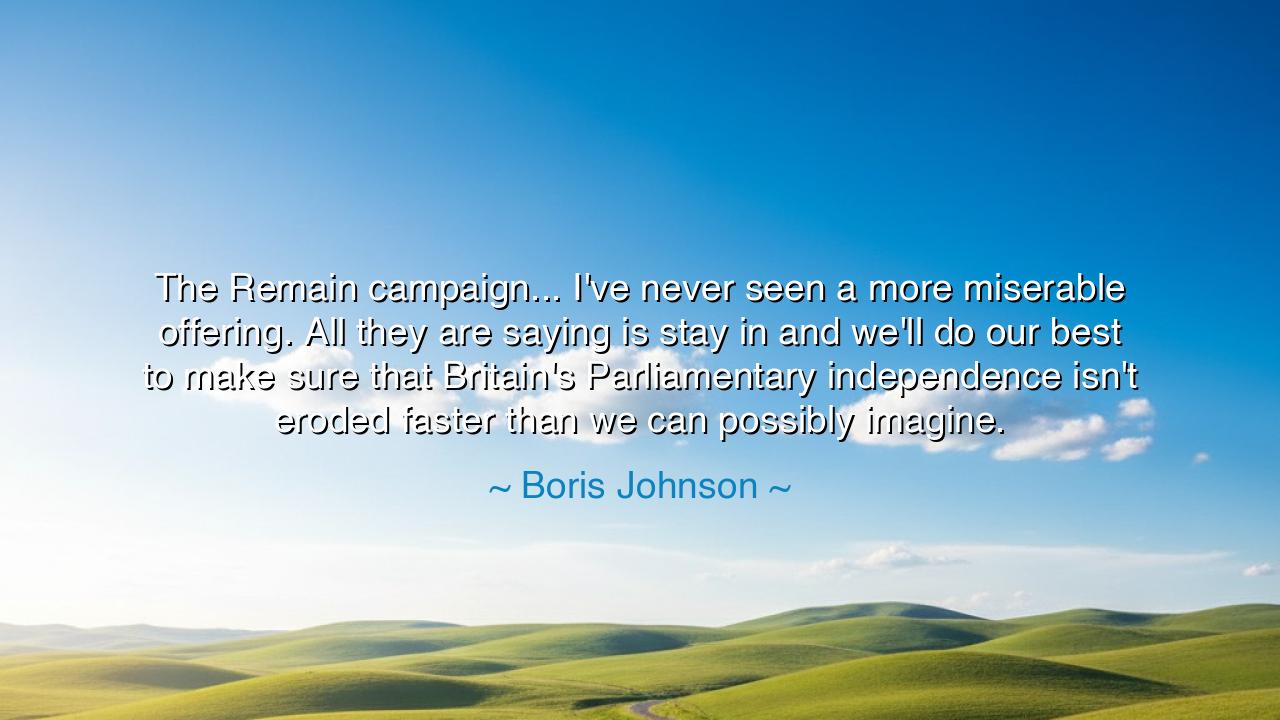
The Remain campaign... I've never seen a more miserable offering.
The Remain campaign... I've never seen a more miserable offering. All they are saying is stay in and we'll do our best to make sure that Britain's Parliamentary independence isn't eroded faster than we can possibly imagine.






There are times when the soul of a nation trembles between security and sovereignty, between the comfort of the familiar and the courage to stand alone. In these moments, the voice of a people must decide whether it will rise with conviction or fade into the quiet decay of dependency. When Boris Johnson declared, “The Remain campaign... I’ve never seen a more miserable offering. All they are saying is stay in and we’ll do our best to make sure that Britain’s Parliamentary independence isn’t eroded faster than we can possibly imagine,” he was not merely speaking of politics — he was crying out against the slow death of self-determination, the surrender of will that follows when freedom is traded for convenience.
The Remain campaign, as he saw it, was a plea for comfort disguised as wisdom. It promised safety in submission, unity through compromise, and prosperity through obedience. Yet, Johnson’s words reveal an ancient truth: that when a people lose the fire of belief in their own governance, they become hollow — citizens in name, but servants in spirit. Parliamentary independence, that sacred inheritance born from centuries of struggle and blood, was being bartered away not in battle, but in boardrooms and bureaucracies. He saw in this not prudence, but resignation — a posture unworthy of a nation that once commanded the seas.
From the days of Magna Carta, when English barons defied a king to claim the rights of law and liberty, the heart of Britain has pulsed with the rhythm of independence. The idea that a people might govern themselves, free from the decrees of distant powers, became a beacon that later inspired revolutions across the world. Yet, as the centuries passed, comfort crept in where courage once stood. The machinery of cooperation became a web, binding the island that once ruled an empire. It is this transformation — from sovereign Britain to subordinate member — that Johnson mourns with sharp and scornful tongue.
Consider the story of another people who faced such a crossroads — the Greeks under Macedonian rule. Once the glory of philosophy, art, and democracy, they fell into complacency after the rise of Alexander. They gained stability, yes, but lost the vigor that made them great. Their cities, once alive with debate and invention, became quiet tributaries to a foreign power. So too does Johnson’s warning echo: when the mind of a people bends too easily to the will of others, their spirit of independence fades, not with violence, but with indifference.
His tone may be mocking, yet beneath it lies the voice of prophecy. The miserable offering he condemns is not just a weak campaign, but a symptom of a civilization that fears standing alone. For independence is not an easy crown to wear — it demands responsibility, vision, and sacrifice. But those who reject it out of fear will one day awaken to find their chains forged not by enemies, but by their own apathy. Johnson’s words are thus a rebuke against the slow corrosion of freedom — not by tyranny, but by self-doubt.
The deeper meaning of this quote is not confined to Britain or the European Union; it speaks to all who wrestle with the tension between comfort and courage. Whether in nations, families, or individual hearts, there is always the temptation to yield one’s voice to the promise of ease. Yet history teaches that no greatness ever grew from submission. Every era’s heroes — from the revolutionaries of America to the patriots of Poland — have chosen the harder path of self-rule over the soft security of dependence.
Therefore, let this be the lesson carried forward: freedom must be defended not once, but always. The erosion Johnson speaks of is not sudden — it is subtle, slow, and seductive. It comes when people stop believing that their own hands can shape their destiny. So guard your independence, whether as a nation or as a soul. Do not let the comforts of belonging silence the call of courage. For as the ancients knew, a people who surrender their freedom for the promise of peace will lose both — and in the end, remember too late that true greatness demands the will to stand alone.






AAdministratorAdministrator
Welcome, honored guests. Please leave a comment, we will respond soon